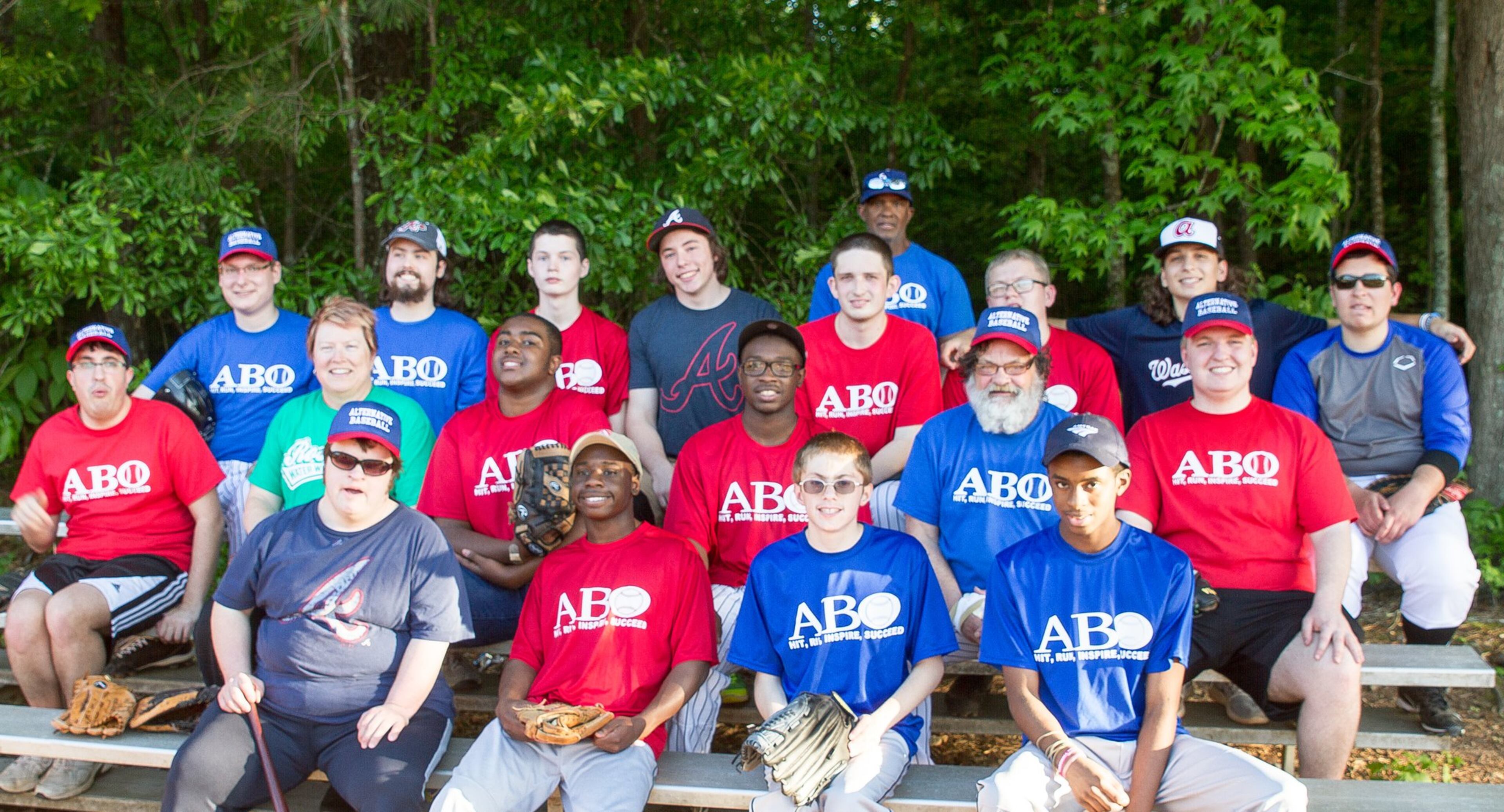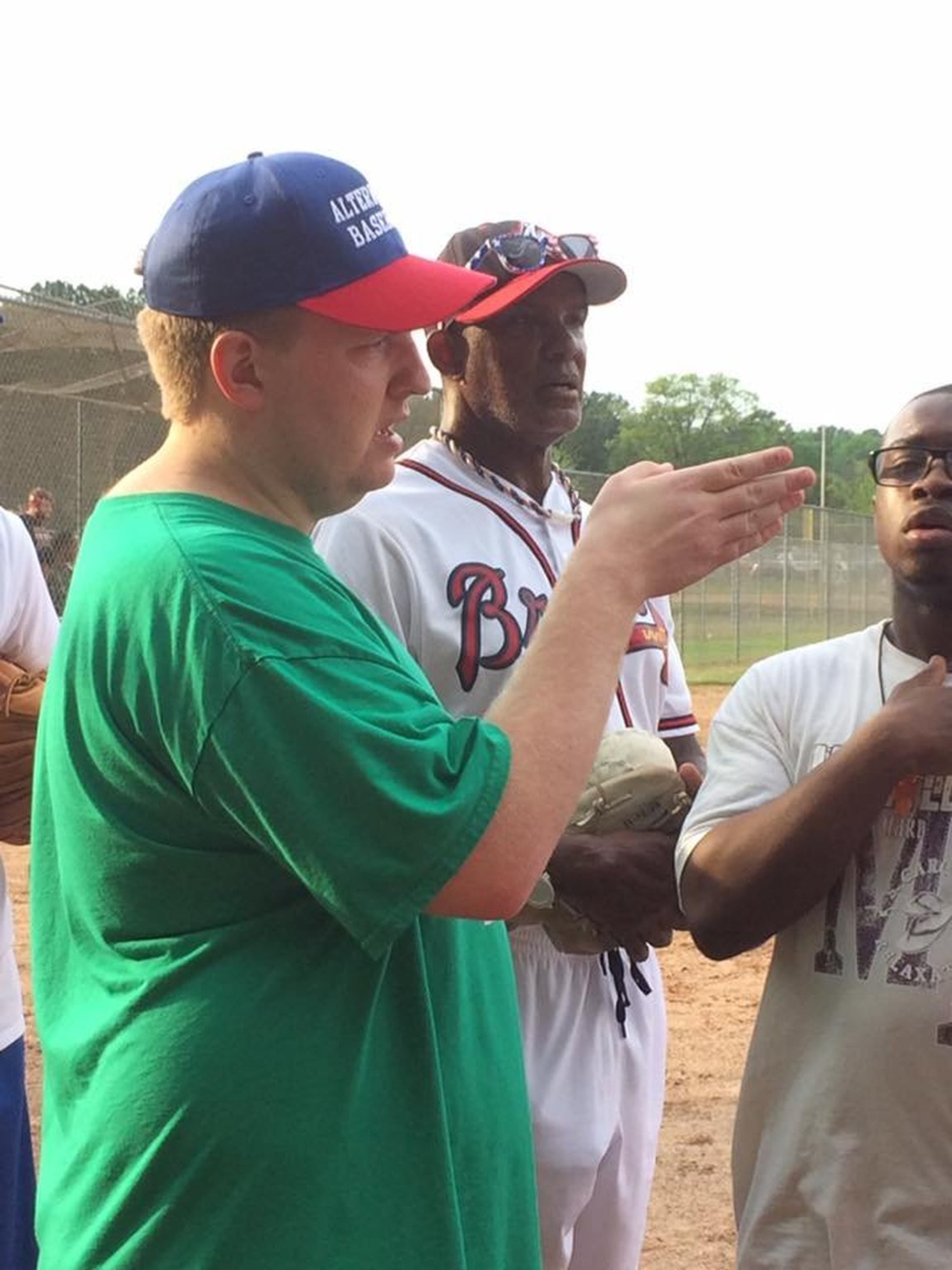What if developmental disabilities get between you and playing ball?

Less than two years ago, Taylor Duncan’s dream for a baseball league that welcomed teens and adults with autism, Down syndrome and other developmental and intellectual disabilities was just that. A dream.
He tried desperately to join one league after another, but each time, he was rejected. Coaches decided he just wasn’t cut out to play ball. The reason, they said, was his autism, which put him more at risk for injury.
That was never good enough for Taylor. If he had nothing else, he had his dream, and he wasn’t about to defer to some cockamamie idea like that.
He couldn’t drive but that didn’t keep him from working the phones until finally he had enough people fueling the dream to someday form the Alternative Baseball Organization and, by year’s end, host his first All-Star Game.
That game last November, he said, was his crowning moment.
“Our players had the chance to play with and learn from some of the best players the country has to offer,” he said recently.
Next week, they’ll get a repeat.

The ABO will host a second All-Star Game, featuring players with autism and other special needs playing alongside past and current professional baseball players like former Cub Bobby Scales and former Brave Anthony Lerew.
“I just think what he’s doing is really awesome,” Lerew said. “If we had more people like him, the world would be a better place.”
The fall classic, which will be broadcast on the organization’s Facebook page on Facebook Live, has become the yearly celebratory event for Alternative Baseball and its players and is scheduled to get underway at 2 p.m. Nov. 11 at Mount Paran North Church of God’s baseball park, 1700 Allgood Road, Marietta.
But rest assured this isn’t just about baseball.
“Growing up, people thought I wasn’t capable of playing, but I knew that I was,” Taylor said.
Taylor Duncan is 21 now, but he has loved baseball since age 4 when he started collecting baseball cards, playing “Backyard Baseball 2001” on his personal computer, and would sit for hours watching the Atlanta Braves on television with his grandmother.
“The excitement and unpredictability of every game is so different,” he said. “No game is ever the same.”
He can rattle off players and stats like a kid saying his ABCs and 123s. His favorite pitcher is Hall of Famer Randy Johnson of the Arizona Diamondbacks and Seattle Mariners; and his favorite hitter is Ichiro Suzuki with the Miami Marlins.
“When he came to America in 2000, a lot of critics said he’d never make it in America because of his unorthodox style,” Taylor said. “Well, he’s made over 3,000 career hits in 17 big league seasons and is to many historians a lock for the Hall of Fame. I wish the Braves would pick him up before he turns 50 and retires.”
Growing up, Taylor had a lot of sensory issues that prevented the family from going out in public, said his mother, Cindy Duncan.
“If it were a new place, he didn’t do well. If there were a lot of people, he wouldn’t do well,” she said. “He’d have a meltdown.”
Doctors would eventually diagnose Taylor with autism, but Cindy Duncan never allowed the label to limit her son’s experiences.
“I just supported him,” she said.
And so naturally it was frustrating to know he wanted to play ball but to have coaches reject him because of a perceived disability.
“Granted he has low muscle tone, but I think it was just a nice way of saying he didn’t quite meet their expectations,” she said. “Some coaches were much more understanding while others didn’t want to deal with it. They were more focused on winning.”
Which meant, when he did make the team, Taylor spent more time on the bench than on the field.
Instead of giving up, Taylor decided that if he wanted to play, he’d just have to coach himself. In 2013, he formed the first slow-pitch team, recruiting players from Craigslist and Facebook. They called themselves Them Dingers, a play on an old-fashioned term for home runs, and made it all the way to the playoffs and championship game.
“Even though we lost the championship game, I walked away with much more than what wins, losses and statistics can show,” Taylor said.

He had experience and had felt the joy of accomplishing something.
Taylor continued coaching teams in local tournaments, and then, in an effort to build his confidence and mechanics and learn more about the sport, he enrolled in spring training camp hosted by Neil Teague in Kissimmee, Fla. The experience was a life-changer for Taylor. The next year, he met with Matthew Kinsey from the Louisville Slugger Warriors for more instruction.
It helped but back home, he was still confronted with the same negative perceptions. That inspired him to found the nonprofit Alternative Baseball Organization. His dream now is to expand the program to other places.
So far, he said, he’s gotten inquiries from 25-plus states and countries that want to start their own program and join the Alternative Baseball network.
What makes the ABO unique, Cindy Duncan said, is her son understands the players. He has a special connection to them because they are just like him. They just want to be accepted for who they are. Most of all, they just want to play ball.
“People have preconceived ideas of what they are able to accomplish,” she said. “When they do have issues, we try to motivate them to be the best they can be in all areas, not just on the field. It’s remarkable to watch them and see how much they can achieve.”
It’s been a learning experience, Taylor said, but he loves every single day of it.

And the game?
“It’s amazing,” he said. “The chance to give these players the opportunity to participate and learn from players regarded as some of the best in the sport is like a dream.”
Only this one has come true.
Find Gracie on Facebook (www.facebook.com/graciestaplesajc/) and Twitter (@GStaples_AJC) or email her at gstaples@ajc.com.
EVENT PREVIEW
Alternative Baseball All-Star Game


